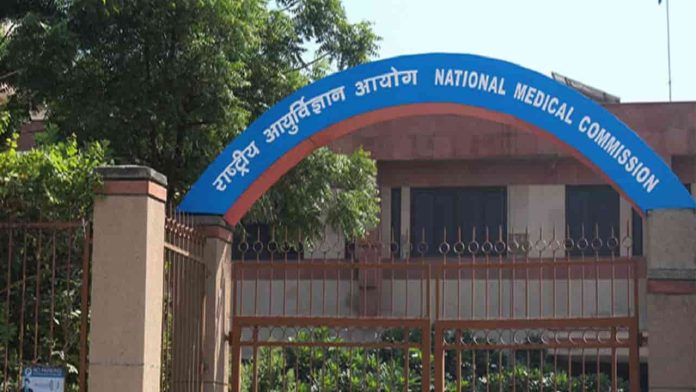With the aim of ensuring smooth compliance with its functions and to maintain high quality and standards, the National Medical Commission (NMC) has published Maintenance of Standards of Medical Education Regulations, 2023, or MSMER-2023.
The draft was introduced in the public domain by the director of the UG Medical Education Board of NMC, Shambhu Sharan Kumar, on June 23, 2023. The NMC has introduced a penalty of up to Rs 1 crore for medical colleges that do not comply with medical education norms. Medical institutions must provide an annual disclosure report to the respective board. Failure to adhere to the norms may result in penalties, further inquiries and even criminal proceedings. The move is intended to improve compliance with standards in medical education, particularly in colleges facing faculty shortages.
Additionally, doctors, departments or institute heads could face penalties up to Rs 5 lakh for submitting false documents.
Under the new regulations, all medical colleges are mandated to furnish an Annual Disclosure Report before the Commission. Also, the respective Board (PGMEB or UGMEB) will undertake evaluation of the Annual Disclosure Report for verifying whether the medical college fulfils the required conditions prescribed by NMC.
These include—verification of physical infrastructure, availability of required number of qualified faculty for actual teaching and research and to undertake necessary student learning activities on a regular and continued basis, availability of adequate clinical material in terms of number of patients of different specialties, variety of patients to fulfill all round training of students, number of procedures, surgeries, laboratory investigations, radiological investigations and other relevant investigations, assessment of the teaching methodology adopted, methods and modes of assessment, grading of the students; review of feedback from students and other parameters related to standards of medical education that may be added from time to time by the respective boards or as per the NMC notification.
The NMC may also withhold and withdraw accreditation for a period up to five academic years. Any attempt to pressurise the UGMEB, PGMEB or NMC through individuals or agency will lead to immediate halt of the processing of all applications by the medical institution, the draft said.
The central government has also introduced a command centre to keep a tab on faculty members, their attendance and patients at outpatient clinics as well as those undergoing surgeries. This centre uses a network of CCTV cameras that each medical college has to install at key points such as OPD entrance, hospital information management system and Aadhaar-based biometric attendance system for the staff.
The regulator has introduced such a monetary penalty for the first time. The move is likely to ensure better compliance with norms as several government and private colleges have been facing faculty shortage. Several government-run colleges, established over the last few years, also do not comply with these norms.
Earlier in June 2023, with the publication of the new Graduate Medical Education Regulations (GMER) 2023 in the official Gazette, medical institutes violating the norms of MBBS admission had to face strict penalties. They were liable to pay a huge fine ranging from Rs 1 crore to Rs 2 crore per seat.
In the earlier draft of GMER 2023 regulations, the UGMEB of NMC had mentioned that medical colleges would have to pay Rs 50 lakh to Rs 1 crore per seat as a penalty for violating the norms of MBBS admission. But in the final GMER, 2023, that was published in the official Gazette on June 2, 2023, the penalty was set to be doubled from the earlier draft.
Specifying that all the students getting admitted to UG medical courses need to clear the NEET-UG examination, the NMC specified in the draft that “no medical institute shall admit any candidate to the graduate course in contravention of these regulations”. The UG Medical Education Board reiterated that it was mandatory for the students to score the minimum eligible score at the NEET-UG exam to pursue graduate medical education either in India or elsewhere.
Further, addressing the issue of backdoor entry in medical admission and in an attempt to put a stop to it, the Commission specified in the draft: “Provided the medical institution granting admission to any student in contravention of these Regulations, shall be liable to be fined for Rupees 50 lakh per seat for the first-time and for the second time of non-compliance, Rupees one Crore per seat and for any subsequent non-compliance or continued contravention the medical institution shall be barred from granting admissions to any students from the next academic year.”
In fact, the flouting of norms by medical colleges is an old issue and has been going on for years all over India. It was in May 2023 that 40 medical colleges all over India were found not complying with NMC norms. Also, about 100 more medical colleges in Tamil Nadu, Gujarat, Assam, Punjab, Andhra Pradesh, Puducherry and West Bengal were on the verge of facing similar action.
Inspections by the NMC found lapses in CCTV cameras, Aadhaar-linked biometric attendance procedures and faculty rolls. According to government data, there was 69% increase in the number of medical colleges since 2014—from 387 before 2014 to 654 as of now, Minister of State for Health Bharati Pravin Pawar had told the Rajya Sabha in February. Even the number of MBBS seats had increased by 94%—from 51,348 before 2014 to 99,763 as of now.
In August 2022, several private medical colleges in Vijayawada were found flouting norms in fee collection from students. After the state government revised the fee structure downwards for PG medical courses, some managements found nefarious ways to recoup this amount from the students. Such incidents have also been found in other private medical colleges in India.
—By Abhilash Kumar Singh and India Legal Bureau


